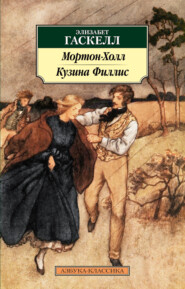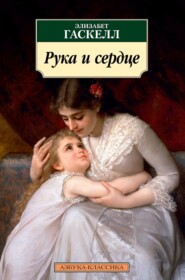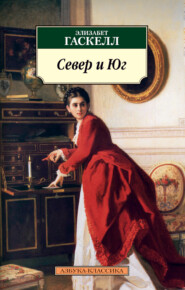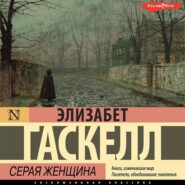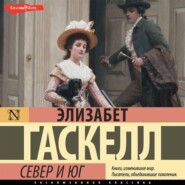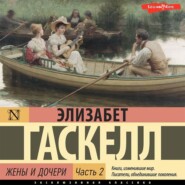По всем вопросам обращайтесь на: info@litportal.ru
(©) 2003-2024.
✖
Ruth
Настройки чтения
Размер шрифта
Высота строк
Поля
"Well, my dear, you must learn to think and work too; or, if you can't do both, you must leave off thinking. Your guardian, you know, expects you to make great progress in your business, and I am sure you won't disappoint him."
But that was not to the point. Ruth stood still an instant, although Mrs Mason resumed her employment in a manner which any one but a "new girl" would have known to be intelligible enough, that she did not wish for any more conversation just then.
"But as I was not diligent I ought not to go, ma'am. Miss Wood was far more industrious than I, and many of the others."
"Tiresome girl!" muttered Mrs Mason; "I've half a mind to keep her at home for plaguing me so." But, looking up, she was struck afresh with the remarkable beauty which Ruth possessed; such a credit to the house, with her waving outline of figure, her striking face, with dark eyebrows and dark lashes, combined with auburn hair and a fair complexion. No! diligent or idle, Ruth Hilton must appear to-night.
"Miss Hilton," said Mrs Mason, with stiff dignity, "I am not accustomed (as these young ladies can tell you) to have my decisions questioned. What I say, I mean; and I have my reasons. So sit down, if you please, and take care and be ready by eight. Not a word more," as she fancied she saw Ruth again about to speak.
"Jenny! you ought to have gone, not me," said Ruth, in no low voice to Miss Wood, as she sat down by her.
"Hush! Ruth. I could not go if I might, because of my cough. I would rather give it up to you than any one, if it were mine to give. And suppose it is, and take the pleasure as my present, and tell me every bit about it when you come home to-night."
"Well! I shall take it in that way, and not as if I'd earned it, which I haven't. So thank you. You can't think how I shall enjoy it now. I did work diligently for five minutes last night, after I heard of it, I wanted to go so much. But I could not keep it up. Oh, dear! and I shall really hear a band! and see the inside of that beautiful shire-hall!"
Chapter II
Ruth Goes to the Shire-Hall
In due time that evening, Mrs Mason collected "her young ladies" for an inspection of their appearance before proceeding to the shire-hall. Her eager, important, hurried manner of summoning them was not unlike that of a hen clucking her chickens together; and to judge from the close investigation they had to undergo, it might have been thought that their part in the evening's performance was to be far more important than that of temporary ladies'-maids.
"Is that your best frock, Miss Hilton?" asked Mrs Mason, in a half-dissatisfied tone, turning Ruth about; for it was only her Sunday black silk, and was somewhat worn and shabby.
"Yes, ma'am," answered Ruth, quietly.
"Oh! indeed. Then it will do" (still the half-satisfied tone). "Dress, young ladies, you know, is a very secondary consideration. Conduct is everything. Still, Miss Hilton, I think you should write and ask your guardian to send you money for another gown. I am sorry I did not think of it before."
"I do not think he would send any if I wrote," answered Ruth, in a low voice. "He was angry when I wanted a shawl, when the cold weather set in."
Mrs Mason gave her a little push of dismissal, and Ruth fell into the ranks by her friend, Miss Wood.
"Never mind, Ruthie; you're prettier than any of them," said a merry, good-natured girl, whose plainness excluded her from any of the envy of rivalry.
"Yes! I know I am pretty," said Ruth, sadly, "but I am sorry I have no better gown, for this is very shabby. I am ashamed of it myself, and I can see Mrs Mason is twice as much ashamed. I wish I need not go. I did not know we should have to think about our own dress at all, or I should not have wished to go."
"Never mind, Ruth," said Jenny, "you've been looked at now, and Mrs Mason will soon be too busy to think about you and your gown."
"Did you hear Ruth Hilton say she knew she was pretty?" whispered one girl to another, so loudly that Ruth caught the words.
"I could not help knowing," answered she, simply, "for many people have told me so."
At length these preliminaries were over, and they were walking briskly through the frosty air; the free motion was so inspiriting that Ruth almost danced along, and quite forgot all about shabby gowns and grumbling guardians. The shire-hall was even more striking than she had expected. The sides of the staircase were painted with figures that showed ghostly in the dim light, for only their faces looked out of the dark, dingy canvas, with a strange fixed stare of expression.
The young milliners had to arrange their wares on tables in the ante-room, and make all ready before they could venture to peep into the ball-room, where the musicians were already tuning their instruments, and where one or two char-women (strange contrast! with their dirty, loose attire, and their incessant chatter, to the grand echoes of the vaulted room) were completing the dusting of benches and chairs.
They quitted the place as Ruth and her companions entered. They had talked lightly and merrily in the ante-room, but now their voices were hushed, awed by the old magnificence of the vast apartment. It was so large, that objects showed dim at the further end, as through a mist. Full-length figures of county worthies hung around, in all varieties of costume, from the days of Holbein to the present time. The lofty roof was indistinct, for the lamps were not fully lighted yet; while through the richly-painted Gothic window at one end the moonbeams fell, many-tinted, on the floor, and mocked with their vividness the struggles of the artificial light to illuminate its little sphere.
High above sounded the musicians, fitfully trying some strain of which they were not certain. Then they stopped playing and talked, and their voices sounded goblin-like in their dark recess, where candles were carried about in an uncertain wavering manner, reminding Ruth of the flickering zigzag motion of the will-o'-the-wisp.
Suddenly the room sprang into the full blaze of light, and Ruth felt less impressed with its appearance, and more willing to obey Mrs Mason's sharp summons to her wandering flock, than she had been when it was dim and mysterious. They had presently enough to do in rendering offices of assistance to the ladies who thronged in, and whose voices drowned all the muffled sound of the band Ruth had longed so much to hear. Still, if one pleasure was less, another was greater than she had anticipated.
"On condition" of such a number of little observances that Ruth thought Mrs Mason would never have ended enumerating them, they were allowed during the dances to stand at a side-door and watch. And what a beautiful sight it was! Floating away to that bounding music – now far away, like garlands of fairies, now near, and showing as lovely women, with every ornament of graceful dress – the elite of the county danced on, little caring whose eyes gazed and were dazzled. Outside all was cold, and colourless, and uniform, one coating of snow over all. But inside it was warm, and glowing, and vivid; flowers scented the air, and wreathed the head, and rested on the bosom, as if it were midsummer. Bright colours flashed on the eye and were gone, and succeeded by others as lovely in the rapid movement of the dance. Smiles dimpled every face, and low tones of happiness murmured indistinctly through the room in every pause of the music.
Ruth did not care to separate the figures that formed a joyous and brilliant whole; it was enough to gaze, and dream of the happy smoothness of the lives in which such music, and such profusion of flowers, of jewels, elegance of every description, and beauty of all shapes and hues, were everyday things. She did not want to know who the people were; although to hear a catalogue of names seemed to be the great delight of most of her companions.
In fact, the enumeration rather disturbed her; and to avoid the shock of too rapid a descent into the commonplace world of Miss Smiths and Mr Thomsons, she returned to her post in the ante-room. There she stood thinking, or dreaming. She was startled back to actual life by a voice close to her. One of the dancing young ladies had met with a misfortune. Her dress, of some gossamer material, had been looped up by nosegays of flowers, and one of these had fallen off in the dance, leaving her gown to trail. To repair this, she had begged her partner to bring her to the room where the assistants should have been. None were there but Ruth.
"Shall I leave you?" asked the gentleman. "Is my absence necessary?"
"Oh, no!" replied the lady. "A few stitches will set all to rights. Besides, I dare not enter that room by myself." So far she spoke sweetly and prettily. But now she addressed Ruth. "Make haste. Don't keep me an hour." And her voice became cold and authoritative.
She was very pretty, with long dark ringlets and sparkling black eyes. These had struck Ruth in the hasty glance she had taken, before she knelt down to her task. She also saw that the gentleman was young and elegant.
"Oh, that lovely galop! How I long to dance to it! Will it never be done? What a frightful time you are taking; and I'm dying to return in time for this galop!"
By way of showing a pretty, childlike impatience, she began to beat time with her feet to the spirited air the band was playing. Ruth could not darn the rent in her dress with this continual motion, and she looked up to remonstrate. As she threw her head back for this purpose, she caught the eye of the gentleman who was standing by; it was so expressive of amusement at the airs and graces of his pretty partner, that Ruth was infected by the feeling, and had to bend her face down to conceal the smile that mantled there. But not before he had seen it, and not before his attention had been thereby drawn to consider the kneeling figure, that, habited in black up to the throat, with the noble head bent down to the occupation in which she was engaged, formed such a contrast to the flippant, bright, artificial girl who sat to be served with an air as haughty as a queen on her throne.
"Oh, Mr Bellingham! I'm ashamed to detain you so long. I had no idea any one could have spent so much time over a little tear. No wonder Mrs Mason charges so much for dress-making, if her work-women are so slow."
It was meant to be witty, but Mr Bellingham looked grave. He saw the scarlet colour of annoyance flush to that beautiful cheek which was partially presented to him. He took a candle from the table, and held it so that Ruth had more light. She did not look up to thank him, for she felt ashamed that he should have seen the smile which she had caught from him.
"I am sorry I have been so long, ma'am," said she, gently, as she finished her work. "I was afraid it might tear out again if I did not do it carefully." She rose.
"I would rather have had it torn than have missed that charming galop," said the young lady, shaking out her dress as a bird shakes its plumage. "Shall we go, Mr Bellingham?" looking up at him.
He was surprised that she gave no word or sign of thanks to the assistant. He took up a camellia that some one had left on the table.
"Allow me, Miss Duncombe, to give this in your name to this young lady, as thanks for her dexterous help."
"Oh – of course," said she.
Ruth received the flower silently, but with a grave, modest motion of her head. They had gone, and she was once more alone. Presently, her companions returned.
"What was the matter with Miss Duncombe? Did she come here?" asked they.
"Only her lace dress was torn, and I mended it," answered Ruth, quietly.
"Did Mr Bellingham come with her? They say he's going to be married to her; did he come, Ruth?"
"Yes," said Ruth, and relapsed into silence.
Mr Bellingham danced on gaily and merrily through the night, and flirted with Miss Duncombe, as he thought good. But he looked often to the side-door where the milliner's apprentices stood; and once he recognised the tall, slight figure, and the rich auburn hair of the girl in black; and then his eye sought for the camellia. It was there, snowy white in her bosom. And he danced on more gaily than ever.
The cold grey dawn was drearily lighting up the streets when Mrs Mason and her company returned home. The lamps were extinguished, yet the shutters of the shops and dwelling-houses were not opened. All sounds had an echo unheard by day. One or two houseless beggars sat on doorsteps, and, shivering, slept, with heads bowed on their knees, or resting against the cold hard support afforded by the wall.
Ruth felt as if a dream had melted away, and she were once more in the actual world. How long it would be, even in the most favourable chance, before she should again enter the shire-hall! or hear a band of music! or even see again those bright, happy people – as much without any semblance of care or woe as if they belonged to another race of beings. Had they ever to deny themselves a wish, much less a want? Literally and figuratively, their lives seemed to wander through flowery pleasure-paths. Here was cold, biting mid-winter for her, and such as her – for those poor beggars almost a season of death; but to Miss Duncombe and her companions, a happy, merry time, when flowers still bloomed, and fires crackled, and comforts and luxuries were piled around them like fairy gifts. What did they know of the meaning of the word, so terrific to the poor? What was winter to them? But Ruth fancied that Mr Bellingham looked as if he could understand the feelings of those removed from him by circumstance and station. He had drawn up the windows of his carriage, it is true, with a shudder.
Ruth, then, had been watching him.






